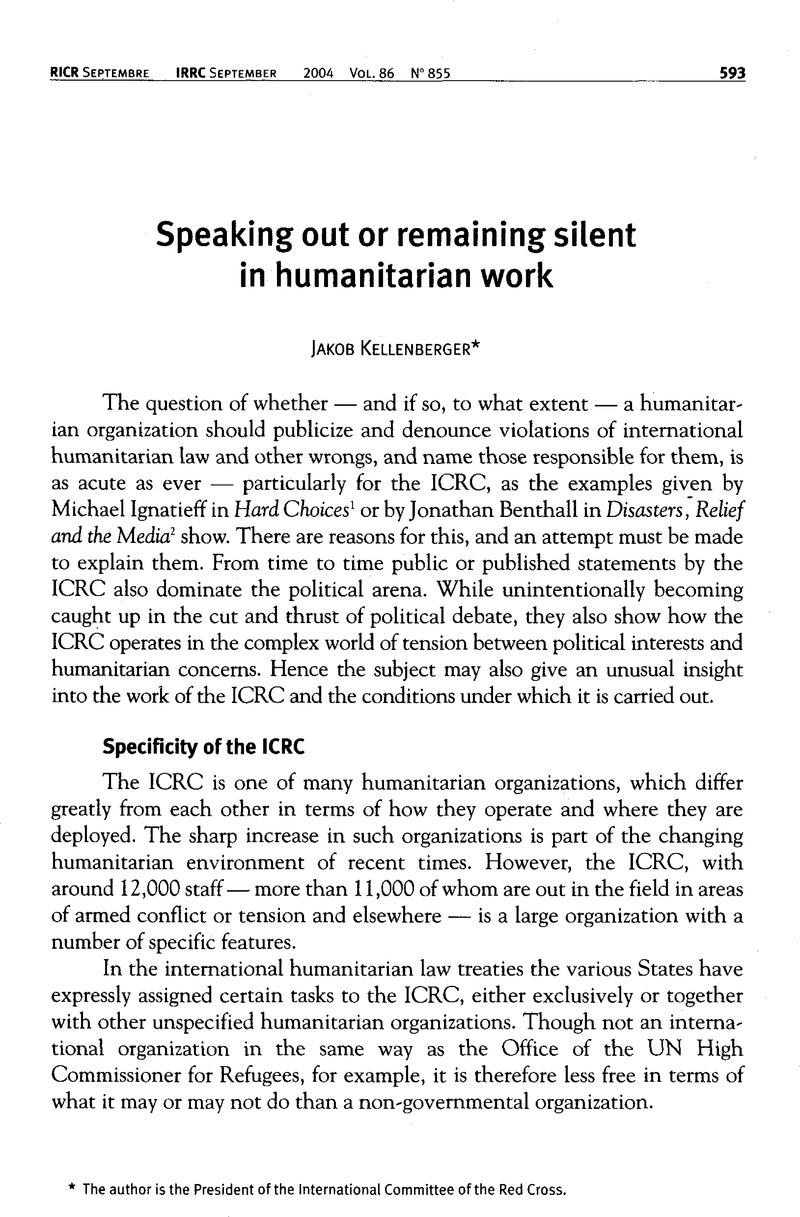Published online by Cambridge University Press: 27 April 2010

1 Ignatieff, Michael, “The stories we tell: Television and humanitarian aid”, in: Moore, Jonathan (ed.), Hard Choices: Moral Dilemmas in Humanitarian Intervention, Rowman & Littlefield Publishers, Boston, 1998, pp. 287–302Google Scholar.
2 Benthall, Jonathan, Disasters, Relief and the Media, I. B. Tauris & Co Ltd, London/New York, 1993Google Scholar.
3 Enzensberger, Hans Magnus, Aussichten aufden Bürgerkrieg, Suhrkamp, Frankfurt am Main, 1993, p. 20Google Scholar.
4 See Münkler, Herfried, Die Neuen Kriege, 6th edition, Rowohlt Verlag GmbH, Reinbek bei Hamburg, 2003, especially pp. 59 ffGoogle Scholar.
5 Thual, François, Les conflits identitaires, Ellipses, Paris, 1995Google Scholar.
6 Hobsbawm, Eric, The New Century, Abacus, London, 2000Google Scholar.
7 The ICRC responded to these tendencies in the report on international humanitarian law and the challenges of contemporary armed conflicts that it presented at the 28th International Conference of the Red Cross and Red Crescent: ICRC, “International humanitarian law and the challenges of contemporary armed conflicts”, Revue Internationale de la Croix-Rouge/International Review of the Red Cross, Vol. 86, No. 853, March 2004, pp. 213–244CrossRefGoogle Scholar.
8 Article 126 of the Third Geneva Convention relative to the Treatment of Prisoners of War, and Article 143 of the Fourth Geneva Convention relative to the Protection of Civilian Persons in Time of War.
9 Article 3 common to all four Geneva Conventions gives the ICRC the right to take the initiative in non-international armed conflicts, in that it may offer its services to the warring parties. For situations other than armed conflicts – in internal disturbances, for example – only the Statutes of the International Red Cross and Red Crescent Movement (Article 5) provide for a similar humanitarian right of initiative.
10 Favez, Jean-Claude, The Red Cross and the Holocaust, Cambridge University Press, Cambridge, 1999Google Scholar.
11 Favez, Jean-Claude, Une mission impossible? Le OCR, les déportations et ies camps de concentration nazis, Éditions Payot, Lausanne, 1988, p. 378Google Scholar.
12 Rufin, Jean-Christophe, L'aventure humanitaire, Gallimard, Évreux, 1994, p. 71Google Scholar. (“To preserve this assistance activity, the Red Cross took the disastrous decision not to state what it knew of the extermination camps.”)
13 “The ICRC and the conflict in former Yugoslavia”, Revue Internationale de la Croix-Rouge/International Review of the Red Cross, Vol. 74, No. 290, September/October 1992, pp. 488–493Google Scholar.
14 Public statement by the ICRC on the situation in Kosovo, published in the Revue Internationale de la Croix-Rouge/International Review of the Red Cross, Vol. 325, December 1998, pp. 725–728Google Scholar.
15 Gadamer, Hans-Georg, Wahrheit und Methode, Crossroad, New York, 1990Google Scholar.
16 “Action by the International Committee of the Red Cross in the event of breaches of international humanitarian law”, Revue Internationale de la Croix-Rouge/International Review of the Red Cross, Vol. 221, March-April, 1981, pp. 76–83Google Scholar.
17 For a detailed account of the ICRC's activities in Rwanda in 1994, see <http://www.cicr.org/Web/fre/sitefreo.nsf/html/rwanda> (last visited on 17 July 2004).
18 UN Security Council resolution No. 929 of 22 June 1994.
19 Hans Magnus Enzensberger, Civil War, London 1994.
20 See Press releases No. 02/11 of 9 February 2002, No. 03/36 of 28 May 2003 and No. 04/03 of 16 January 2004.
21 The Wall Street Journal of 7 May 2004 quoted lengthy excerpts from a confidential report dated January 2004 on the conditions in prisons in Iraq visited by the ICRC, which had been handed to the Coalition forces in February 2004. The report was published without the ICRC's consent. It is marked as confidential and intended only for the authorities to which it was given, and attention is expressly drawn to the fact that it may not be published in part or in its entirety without the ICRC's consent. The compiling and submission of a report is part of the ICRC's standard procedure for prison visits worldwide.
22 See ICRC Annual Report 2003, ICRC, Geneva, 2004, p. 42Google Scholar.